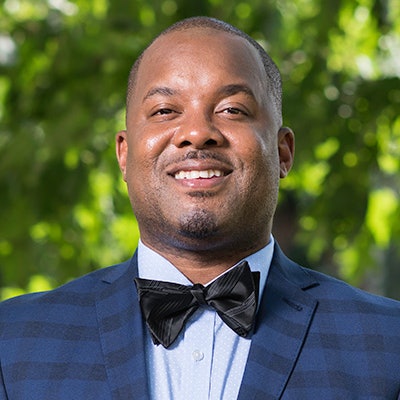The budding Black studies department at the University of Rochester will fast-track their hiring of faculty with the help of a $3 million grant from the Mellon Foundation. Dr. Jeffrey Q. McCune, Jr.University of Rochester
Dr. Jeffrey Q. McCune, Jr.University of Rochester
Though the school and department had initially planned to cluster-hire faculty for the department over the next five years, the new influx of funding – via the foundation’s Higher Learning program – will allow them to expedite their schedule, said Dr. Jeffrey Q. McCune, Jr., chair of faculty programs and departmental initiatives in the university's Black studies department.
“What the Mellon grant does is it allows us to bring the department to full scale, meaning that we can actually hire up to nine to 12 people in a three-year period," McCune said. “The Mellon Foundation allows us to walk, perhaps even run, rather than crawl."
Building off of its decades-old Frederick Douglass Institute for African and African American Studies, the New York state private research university established its Black studies department in late 2022, an endeavor headed by McCune, an associate professor of Black studies.
In its first year, the nascent department had three faculty members: McCune, Dr. Jordan Ealey, a feminist scholar-artist; and Dr. Philip V. McHarris, who examines racial inequality, housing, and policing.
McCune said he knew when he arrived at the university, that the creation and fast growth of a Black studies department would require not just university investment but also external support.
“We had to find outside funding that would facilitate the expedition of hiring,” he said.
Already having committed to making several cluster hires for the department, the university turned to the Mellon Foundation to help quicken the pace of expansion, said Dr. David Figlio, the university's provost.
The school will look to cluster-hire three new tenure-track faculty, particularly with a focus on scholars in Black geographies and Black sexuality and/or trans studies, as well as an additional open-field search, according to university officials.
Black geographies – “locations and spaces that condition and determine the outcomes of Black lives” – and Black sexuality and gender are currently cutting-edge topics within Black studies, McCune said.
“One of the reasons why we have an open-field is because the field of Black studies is ever-evolving,” McCune said. “And we definitely want to be open to some of the more trans-disciplinary and radically interdisciplinary areas that may not be as salient or evident to us at this present moment."
In a couple years, he added, "we could be looking at the influence of AI technologies on Black life. You could be looking at disease and interdisciplinary public health. We could be talking about a certain kind of medical humanities that infiltrates Black studies," he said.
One of the goals of becoming and growing the department is to attract more students to the major, McCune said.
“The major in Black studies was decades old, but historically faculty were borrowed from other units. Over those years as a program, we had dozens of majors,” McCune said. “In a year’s time, we are already seeing an increase in students declaring majors. We anticipate that we will see an even larger increase in majors, after departmentalization and growth of faculty.”
And having Black studies housed in its own department instead of as an Institute taught by a “coalition of the willing” from other departments, also allows for the opportunity to better organize and plan ahead, Figlio said.
"A department really gets to own its future,” he said. “A department gets to go and say, 'This is the direction we want to go.' It's not based on [people with particular interests cobbling together a major]. Instead, the department can say: 'This is where the University of Rochester thinks the future of the field is going to be. And we're going to intentionally build programs and hire faculty to point in the direction where we think the field is going.'"
At a time when many institutions are cutting back and abandoning Black and ethnic studies, Raquel Williams, a junior at the University of Rochester, who is double majoring in health policy and African/African American studies, praised the university's vision.
"It just needs to expand. We have a lot here, but we also have a long way to go,” Williams said. “I think [new faculty] can add different perspectives and three new people who can talk about their experiences within Black studies and what that adds to the field.”















